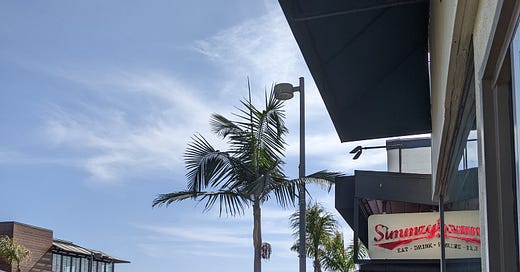Los Angeles gets stereotyped more than most cities.
For example, Nobody Walks In LA.
Simply untrue.
Granted, you’ll find car-dependent, pedestrian-unfriendly soullessness throughout this otherwise great city. However, you’ll also discover dozens of neighborhoods more than suitable and comfortable for walking.
I walk in LA. A lot.
I’d put the neighborhood I walk in most up against any in the country. It’s akin to a Main Street town, as many great urban neighborhoods are. They feel like little cities within a big city.
New York. San Francisco. Los Angeles. And countless places like them.
At day’s end, they’re just a series of neighborhoods. Distinct neighborhoods, each with their own pros and cons.
I can handle some negatives as long as I can walk.
In Southern California, I can also regularly visit other places with their own vibe—and walkability.
Such as Manhattan Beach.
Just as you can’t stereotype Los Angeles, you can’t lump all of our experiences of retirement together.
They’re distinct.
Even if you conclude you’ll Never Retire, your experience of semi-retirement and working in retirement will differ from mine and the person reading next to you. If two people have similar experiences, there will still be meaningful differences, even if only by the numbers.
With this in mind, we often look for ways to find completely common ground.
Because, as humans, we get off on shared experience. And because the neater an explanation, the easier it is make sense of whatever we face, individually and collectively.
Which leads me to something I wrote last week on Medium—
I’m convinced picking the most appropriate exercise — and giving up what isn’t suitable — holds a significant chunk of the key to ageing.
To ageing gracefully.
We should apply the same philosophy to how we work.
If we work less now, we preserve our body and mind so we can work less longer.
After years of probably pushing myself way too hard in the gym and on bikes, I finally discovered that walking generates the best results for where I want to be physically and mentally.
Brisk, but still casual and easy, low-impact walking.
Of course, science routinely backs up the benefits of walking, including the findings from a recent study out of the UK—
A new study found a causal link between brisk walking and telomere length. Researchers found that 10 minutes of brisk walking per day was associated with longer life expectancy, and brisk walkers have up to 20 years’ greater life expectancy than those who walk slowly.
This helps support the notion that doing age-appropriate exercise can keep you healthy, if not lengthen your life.
Some of us instinctively think going super hard—pushing ourselves—provides benefits. In reality, this proud, often macho approach only sets our bodies back, quite possibly making us age faster.
Slow and steady wins the race. Moderation. And so on.
I apply the same thinking to work—
Work less today so you can work less longer.
You can extrapolate this out to your larger Never Retire strategy.
If you’re of modest means, you might have to do everything to the max now—work, save, invest, buy a house—in anticipation of and preparation for traditional retirement. To have even a fighting chance at traditional retirement, you gotta go for it—and go for it hard—now.
Some people genuinely enjoy this process. It works for them.
This isn’t the case for many of us.
So just as we might choose to walk rather than beat up our bodies with relatively harsh exercise. Just as we might opt for less work now so we’re capable and strong enough—physically and mentally—to work less longer. We can apply this philosophy to every element of our own individualized Never Retire strategy.
Instead of stressing to do everything with money now, we take a scaled back approach that allows us to spread everything we do across the lifespan.
Maybe we even wait until the second half of life to buy a home!
What sounds healthier, sustainable, and more appealing?
Working 8-to-12 hour days, 5-7 days a week for 20, 30, 40 years or more
-OR-
Working a few hours a day, most, but not all days of the week into relative old age
We organize money and work around our lives, not the other way around.
But this is about more than us high-fiving one another in agreement.
It feels great to do that and all, however it means very little if the philosophy (which helps craft your strategy) lacks substance and utility.
Which is why it’s important for each of us to assess every aspect of our personal finance alongside what we want from life now and going forward. From there we can decide if it makes more sense to walk or run to the life you wanna live now and the exciting long-term goals we have as we enter relative old age.




